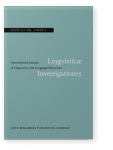Vol. 19:2 (1995) ► pp.429–441
Formes Simples en 0-
The linguistic fund, that is, the actual lexical inventory of a language, is always considerably larger than the sum total of the contents of dictionaries for that language. It corresponds to all the possibilities of derivation and compounding — with the associated word-formation rules. The exploitation of the latter within machine-readable dictionaries should therefore allow a far more accurate coverage of the linguistic fund, by generating thousands of additional entries, some being more or loss widely attested in their written form, some representing the set of virtual words generated by a productive rule that have not, for one reason or another, been recognized as existing words. Note that the boundary between the two subsets is not clearcut. The conditions which determine whether a generated form will belong to one or the other have not given rise to extensive studies, neither in linguistics nor in lexicology, in spite of their significance for a better understanding of lexical creativity and word-formation processes. The relevance of such phenomena seems to have been greatly underestimated — as is indicated by the fact that no studies have been fulfilled on the topic of words such as médico-légal and franco-québécois. We will demonstrate and illustrate for the French language the shortcomings of the simple compiling method and how ignoring them has led to unnecessary complications in the field of electronic lexicography.
